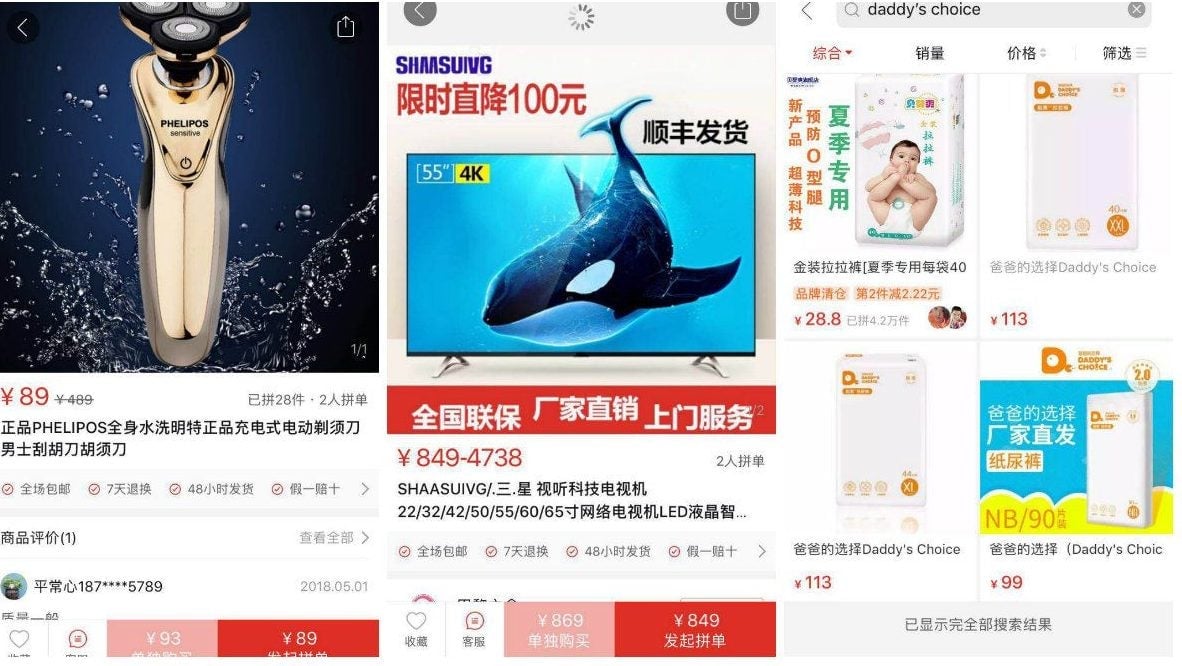China’s latest tech darling is selling a treasure trove of fake goods
In many ways, Pinduoduo is an impressive Chinese tech startup. The three-year-old company, which offers an eponymous online shopping platform, raised about $1.6 billion in a US IPO last week, reaching a valuation of about $30 billion on its first day of trading.


In many ways, Pinduoduo is an impressive Chinese tech startup. The three-year-old company, which offers an eponymous online shopping platform, raised about $1.6 billion in a US IPO last week, reaching a valuation of about $30 billion on its first day of trading.
But something is wrong on Pinduoduo. A careful look at the platform reveals scores of shoddy counterfeit products pretending to be from well-known brands—and increasingly, those brands are speaking up.
Over the weekend, Skyworth, a Chinese manufacturer of audiovisual equipment, demanded Pinduoduo remove counterfeit Skyworth products from the platform, and said it reserves the right to sue over the matter. On July 19, US diaper maker Daddy’s Choice filed a trademark infringement lawsuit against Pinduoduo in a New York federal court (paywall). It alleges the Chinese company knowingly allows the sale of knockoff products bearing its name.
Pinduoduo claims it works to stop vendors from selling fake products. It says, for example, that if a product proves to be a counterfeit, the seller must refund the buyer 10 times the asking price (paywall). The platform also has an area where users can report counterfeits.
Nevertheless, it isn’t hard to quickly spot fake goods on Pinduoduo. Often the knockoffs have a name that closely resembles a well-known brand, albeit with slight variations in Chinese characters. The choice of fonts and other design elements usually makes it clear which brand is being imitated.
In Skyworth’s case, seven of the eight fakes it identified added characters following Chuang Wei, the company’s Chinese name, it said in a statement (link in Chinese). One, for instance, used Chuang Wei Mei (mei means beautiful). Another went with Chuang Wei Xian Feng (xian feng stands for pioneer). In another case, a knockoff used an alternative Chinese character with a hard-to-spot difference, especially on a screen: 維 instead of 维.
This month the Chinese smartphone maker Vivo said it had found knockoffs on Pinduoduo bearing the name Vivi. It’s discussing the problem internally before taking any steps, it added (link in Chinese).
Meanwhile shoppers have noticed a brand called Shaasuivg that bears a striking resemblance to Samsung (link in Chinese).
Pinduoduo declined to comment.
The modified brands sell products at cut-throat prices, appealing to the price-sensitive shoppers Pinduoduo targets in China’s lower-tier cities. Offering group-buying deals (similar to Groupon) has helped fuel the platform’s popularity, as shoppers recruit one another on Chinese social media and in the process spread the word about Pinduoduo.
Pinduoduo is not alone when it comes to counterfeit products. In January, US trade officials classified Alibaba-owned Taobao as a “notorious market” (pdf, p. 20) for counterfeiting, despite the company saying it had stepped up efforts to regulate its marketplace.
“It’s impossible to jump across the development phase,” said Pinduoduo founder Colin Huang (link in Chinese) when asked about the problem last week. “Pinduoduo’s lucky partly because we’ve seen the paths taken by others like Alibaba, so we might avoid some of them… but we have to go through the same road and endure the same suffering.”
That suffering will likely include, increasingly, legal action.
Ziyi Tang contributed reporting.